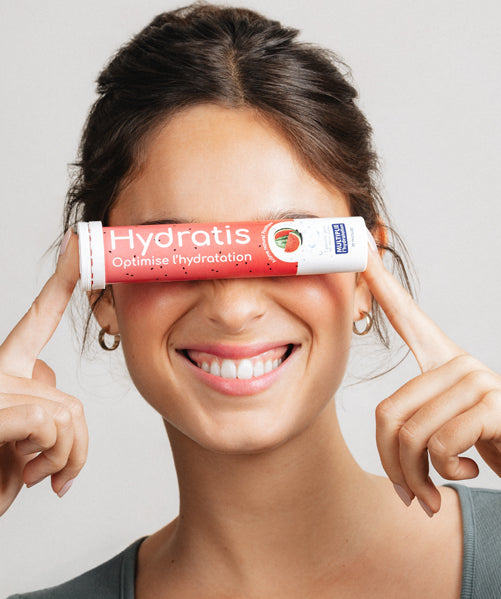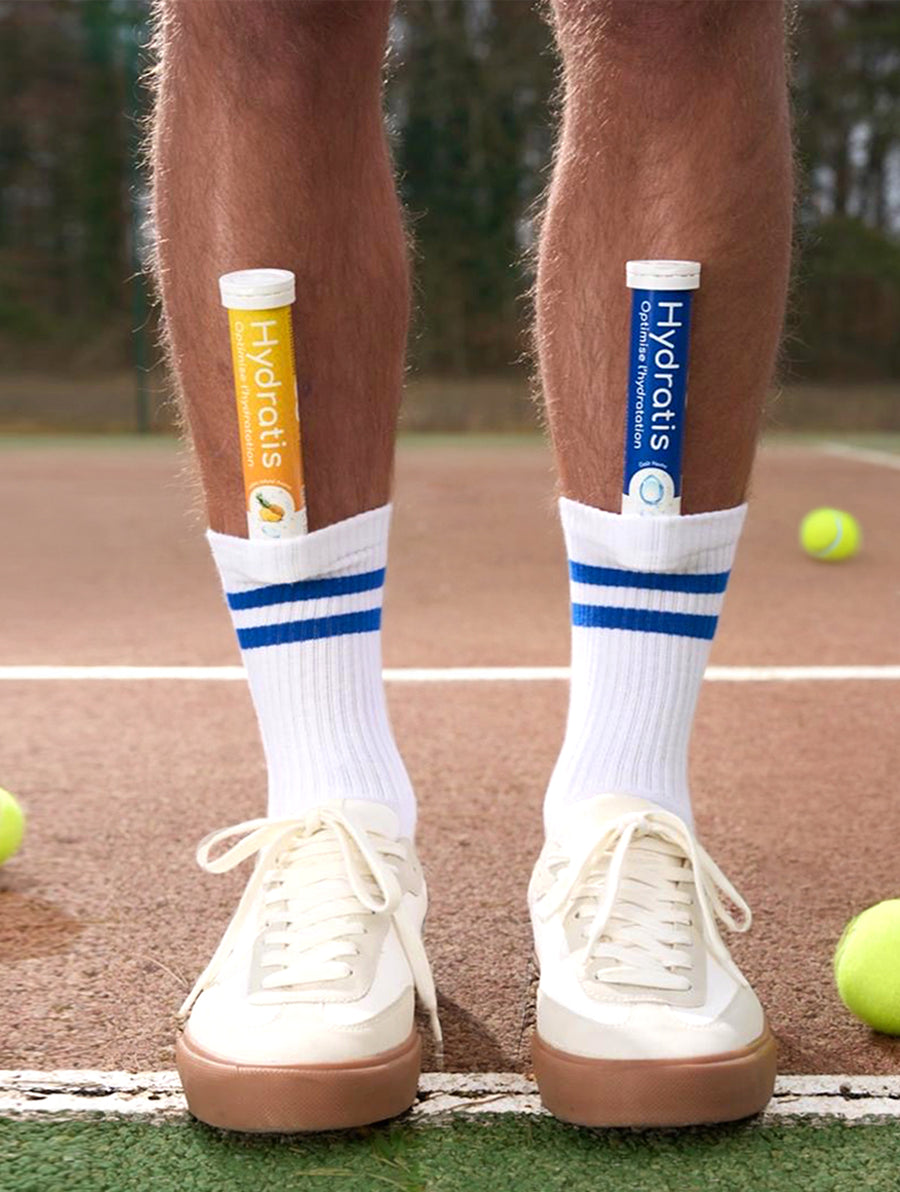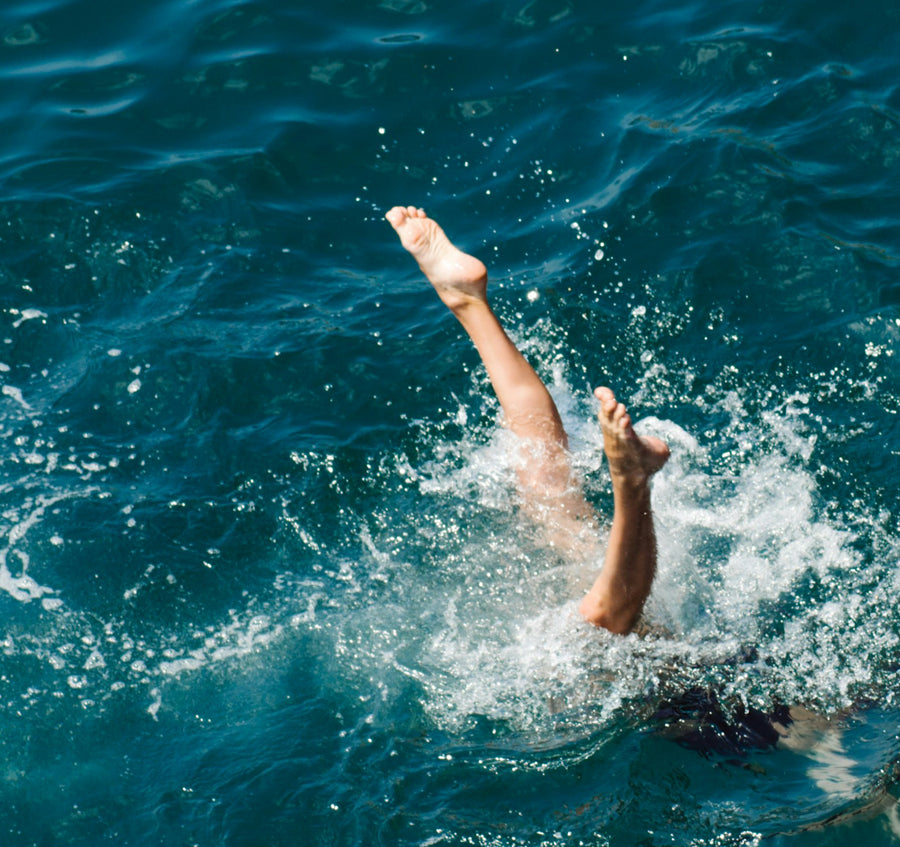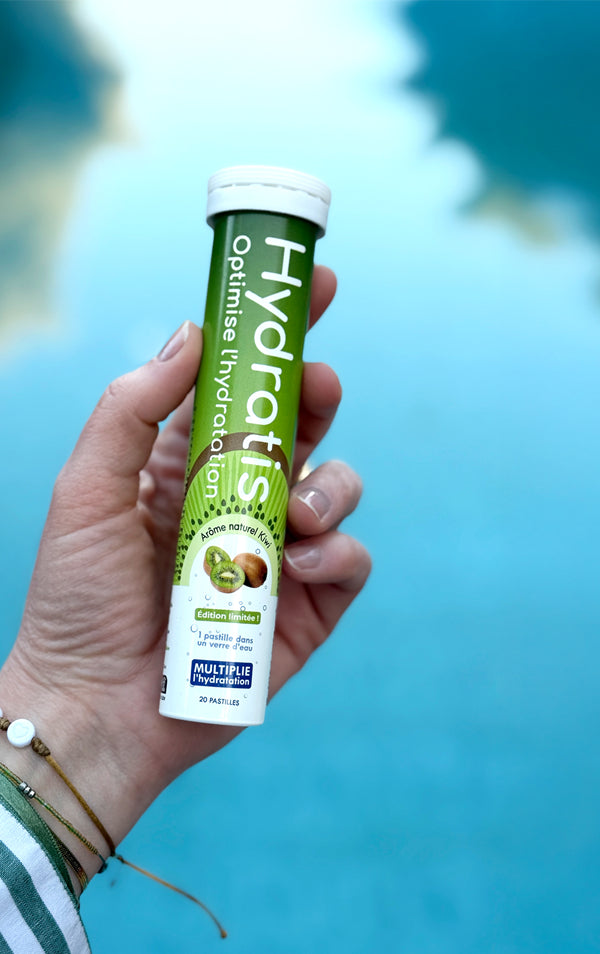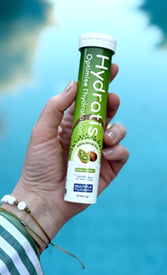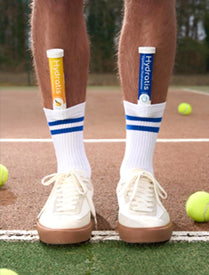Should you drink 2, 3 or 4 liters of water per day when you do sports? Whether you are a runner, cyclist, or bodybuilder, the question inevitably arises.
Between general recommendations and actual needs, it's not easy to find your way. Yet, inadequate hydration can ruin your performance, increase the risk of cramps, or slow down your recovery .
So, how many liters of water per day should an athlete drink to maintain performance?
This article helps you estimate your water needs , adjust your consumption, and understand the effects of insufficient hydration.
How much water should you drink per day to stay healthy?
How much water should I drink per day?
For a healthy, sedentary adult , the European Food Safety Authority ( EFSA ) recommends a daily intake of approximately 2 liters for women and 2.5 liters for men . This total includes both the water you drink and the water contained in your food (fruits, vegetables, soups).
These values serve as a basis, but they are not always sufficient.
Water requirements vary considerably from one individual to another depending on weight, age, climate, and other factors. In athletes, they can easily exceed 3 liters per day , or even more in cases of high temperatures or prolonged exertion.
Do we really need to drink 8 glasses of water a day?
This rule is far too generic. While it can certainly serve as a practical guideline , it does not reflect the diversity of water needs.
Some people need to drink more and others do not.
The best indicator remains your own body . The frequency of urination and especially the color of your urine are reliable signals. Clear urine generally indicates good hydration, while a dark color suggests a lack of fluid.
How to calculate your individual water needs
To know how much to drink daily when you are doing sports, adopt a personalized approach rather than relying on generic advice.
To estimate your basic needs, you can use as a general guideline: between 30 and 35 ml of water per kilo of body weight per day.
If you weigh 90 kg, this represents approximately 2.7 to 3.1 L per day.
This data corresponds to an average estimate of your basic needs , to be adjusted according to the climate, the rate of perspiration and during prolonged exertion.
How to adapt your hydration to physical activity?
The impact of physical exercise on hydration
During training or competition, body temperature increases . To avoid overheating, your body uses thermoregulation mechanisms .
Sweating leads to fluid loss that can reach 0.5 to 2 liters per hour of exertion, or even more under certain conditions. It all depends on the duration and intensity of the exercise, environmental conditions (heat, humidity, altitude, etc.), and your individual characteristics.
Through sweat, you also lose electrolytes . such as sodium, potassium, and magnesium. These minerals play a key role in muscle contraction, fluid balance , and nerve transmission. Hence the importance of sufficient and appropriate supplementation.
How do you calculate your water losses?
The simplest method is to measure the change in body mass . Simply weigh yourself before and after your workout, preferably in your underwear. The difference between the two values represents the volume lost : each kilogram lost corresponds to approximately 1 liter of water eliminated .
Example :
- Before: 82.0 kg
- After: 81.2 kg
- Weight loss: 0.8 kg → 0.8 L
For a more accurate estimate, use the simplified formula :
Total water loss (L) = (Weight before − Weight after) + Beverages consumed − Urine excreted
Note : if you wish to measure your urine, use a graduated container or estimate it visually between 150 and 300 ml depending on the case.
Case study :
- Body mass lost: 0.8 kg
- Water consumed during the session: 500 ml (0.5 L)
- Urine output: 200 ml (0.2 L)
Calculation: 0.8 + 0.5 − 0.2 = 1.1 liters of actual perspiration
The general rule is to compensate for approximately 150% of the lost volume .
For this example, this therefore corresponds to 1.6 L (1.1 × 1.5).
When and how should you drink to optimize hydration?
Before training or competition
It is advisable to drink normally in the days leading up to your session . Within 4 hours of your session, you can take 5 to 7 ml per kilogram of body weight (i.e., 350 to 500 ml for 70 kg). The goal is to start well hydrated without digestive discomfort .
During exercise: how to drink during exertion?
The sensation of thirst is a late indicator of dehydration . It is therefore best to anticipate your needs by drinking small amounts at regular intervals.
Depending on the intensity, outside temperature, terrain conditions and your rate of perspiration, you should plan on between 500 ml and 1 liter per hour .
After exercise: recover by hydrating.
Post-exercise rehydration is essential to replenish lost fluids, facilitate muscle recovery, and prevent soreness and cramps. Ideally, you should drink 1.2 to 1.5 times the volume lost during the workout.
Which water should I choose for hydration?
Not all liquids you consume have the same effect on your body. Their composition impacts your recovery, electrolyte balance , and digestive comfort.
What type of water is best for athletes?
The choice of water you drink depends on the time (before, during or after the session), the weather conditions and the terrain, etc.
|
Situation |
Choice |
Why? / Advantages |
|
Daily consumption |
Filtered tap water or low-mineral water |
Well tolerated, quickly absorbed, meet basic needs |
|
Intense exertion, heat, profuse sweating |
Waters enriched with salt or mineralized (rich in sodium, potassium or bicarbonates) |
They compensate for the salts lost through sweat Occasional use |
|
Recovery phase |
They aid muscle contraction and reduce cramps. |
Naturally flavor your water to make it more enjoyable to drink. Taste directly influences how often you drink it. And good hydration relies above all on consistency .
Drinks that complement hydration: should you drink something other than water?
Water remains the foundation, but certain situations justify additional elements:
- Isotonic drinks : ideal during prolonged exertion to replenish water, electrolytes and carbohydrates.
- Infusions and light teas : additional intake without excess caffeine.
- Diluted fruit juices : sources of energy, vitamins and minerals.
On the other hand, limit sugary drinks like sodas or those too high in caffeine.
What foods can supplement hydration?
Some foods are naturally hydrating and can supplement your intake:
- Fruits : watermelon, melon, oranges, strawberries
- Vegetables : cucumber, zucchini, tomato
- Soups and broths : good sources of water and minerals
In addition to their water content, they also provide you with vitamins and antioxidants .
What are the consequences of poor hydration?
Water makes up approximately 60% of an adult's body mass . It plays a role in all vital functions : thermoregulation, digestion, nutrient transport, waste elimination, muscle contraction…
Inadequate hydration , whether insufficient or excessive , can harm both your health and your performance.
The effects of dehydration on athletic performance
Even mild dehydration has a This has a direct impact on your physical and cognitive abilities. Even a 2% loss of body fluid exposes you to early fatigue , decreased speed and endurance, an increased risk of cramps and injuries, as well as difficulty concentrating. Beyond 3 to 4% , the effects become more serious: palpitations, confusion, loss of consciousness, and heatstroke.
Whether in a team or in an individual discipline, neglecting your hydration means compromising both your performance and your health .
The dangers of drinking too much water
Although rare , overhydration can lead to what is known as a Hyponatremia , or a dilution of sodium in the blood , manifests as nausea, headaches , and, in severe cases, seizures. It occurs when you drink large quantities of pure water without electrolytes, particularly during prolonged exertion.
The key, therefore, remains balance: drinking enough while adjusting salt intake to the duration and intensity of the workout. In other words, opt for a drink containing sodium when the effort is prolonged.
Frequently Asked Questions (FAQ)
Is it good to drink 3 liters of water a day?
This amount is suitable for most athletes who engage in moderate activity. It all depends on factors such as the climate and/or your perspiration rate. If your urine remains clear to pale yellow, it's a good indicator that this volume is appropriate for you.
Why do some athletes drink 4 liters of water a day?
Endurance athletes (long-distance runners, cyclists, triathletes) who train for several hours lose a lot of fluid through sweat. To compensate and maintain optimal hydration, they may need higher than average amounts of fluid.
Is it dangerous to drink 5 liters of water a day?
It depends. If you lose 2 to 3 liters during extremely strenuous activity, this volume might be appropriate. However, for a sedentary person, it's excessive. The main danger lies in drinking so much in such a short period without replacing the lost salts.
What happens if you don't drink enough water?
Dehydration leads to fatigue, decreased performance, muscle cramps, and difficulty concentrating. In the long term, it can cause kidney and cardiovascular problems.
Does water really influence your training?
Absolutely. Proper hydration improves endurance and recovery, regulates body temperature, and optimizes muscle and nerve function. Neglecting this factor can compromise your results, even with intense training.
Conclusion
In a balanced sports nutrition strategy , water plays a key role alongside proteins, carbohydrates, and micronutrients. Adequate hydration not only supports endurance and strength but also helps prevent cramps and regulate body temperature.
Although there is no universal amount, an athlete should aim for between 2.5 and 3.5 liters per day . This base should be adjusted according to weight, activity level, and ambient temperature.
It's also essential to adjust your hydration before, during, and after exercise to optimize your performance. Monitor your fluid losses, replenish them gradually, and always combine water, electrolytes, and hydrating foods.
Bibliography
European Food Safety Authority (EFSA). (2010) . Scientific opinion on dietary reference values for water. EFSA Journal, 8(3), 1459. https://doi.org/10.2903/j.efsa.2010.1459
Baker L.B. (2017) . Sweating Rate and Sweat Sodium Concentration in Athletes: A Review of Methodology and Intra/Interindividual Variability. Sports medicine (Auckland, NZ), 47(Suppl 1), 111–128. https://doi.org/10.1007/s40279-017-0691-5
McDermott, BP, Anderson, SA, Armstrong, LE, Casa, DJ, Cheuvront, SN, Cooper, L., Kenney, WL, O'Connor, FG, & Roberts, WO (2017) . National Athletic Trainers' Association Position Statement: Fluid Replacement for the Physically Active. Journal of athletic training, 52(9), 877–895. https://doi.org/10.4085/1062-6050-52.9.02
Barley, OR, Chapman, DW, & Abbiss, CR (2020). Reviewing the current methods of assessing hydration in athletes . Journal of the International Society of Sports Nutrition, 17 , Article 52. https://doi.org/10.1186/s12970-020-00381-6
Sawka, MN, Burke, LM, Eichner, ER, Maughan, RJ, Montain, SJ, & Stachenfeld, NS (2007 ). Exercise and Fluid Replacement . Medicine & Science in Sports & Exercise, 39(2), 377–390. https://doi.org/10.1249/mss.0b013e31802ca597
Cheuvront, SN, & Kenefick, RW (2014). Dehydration: physiology, assessment, and performance effects. Comprehensive Physiology , 4 (1), 257–285. Dehydration: Physiology, Assessment, and Performance Effects - Cheuvront - 2014
Hew-Butler, T., Rosner, MH, Fowkes-Godek, S., Dugas, JP, Hoffman, MD, Lewis, DP, ... & Verbalis, JG (2015) . Statement of the Third International Exercise-Associated Hyponatremia Consensus Development Conference, Carlsbad, California, 2015. Clinical Journal of Sport Medicine, 25 (4), 303-320. https://doi.org/10.1097/JSM.0000000000000221
Academy of Nutrition and Dietetics, Dietitians of Canada, & American College of Sports Medicine. (2016). Joint position statement: Nutrition and athletic performance. Medicine & Science in Sports & Exercise, 48(3), 543-568. https://doi.org/10.1249/MSS.0000000000000852
